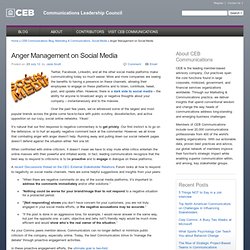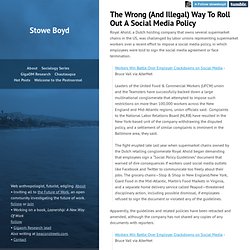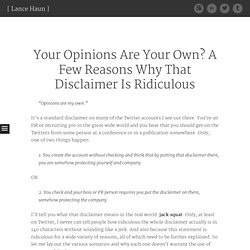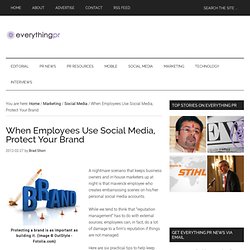

How To Instill Employees With Social Media Sensibilities. 5 tips for creating and communicating employee social media guidelines. Social Media Compliance Isn't Fun, But It's Necessary - Ryan Holmes. By Ryan Holmes | 1:00 PM August 23, 2012 On May 24, 2012, Goldman Sachs did something it had never done in its venerable 143-year history.

It tweeted. “We are now live on Twitter (finally) at the GS Annual Meeting,” chirped the inaugural tweet. “Follow us here for updates on our work, our research, and our people.” 132 characters for Goldman; one giant leap for the Twitterverse. For highly regulated sectors like finance, social media can be a legal minefield. These hurdles aren’t unique to financial services — insurance, pharmaceuticals, health care and government all face regulation, to name a few examples.
Complicating matters, social media in the enterprise is spreading at viral speeds. The good news is that implementing an effective social media compliance process isn’t rocket science. “Everything starts with a firm’s social media policy,” Langford says. Once a policy is in place, training is critical. CEC Insider » Anger Management on Social Media.
Twitter, Facebook, LinkedIn, and all the other social media platforms make communicating today so much easier.

More and more companies are seeing the benefits to having a presence on these channels, allowing their employees to engage on these platforms and to listen, contribute, tweet, post, and update often. However, there is a dark side to social media – the ability for anyone to broadcast angry or negative thoughts about your company – instantaneously and to the masses. Over the past few years, we’ve witnessed some of the largest and most popular brands across the globe come face-to-face with public scrutiny, dissatisfaction, and active opposition on our cozy, social online networks.
Yikes! It’s natural that our first response to negative commentary is to get prickly. When confronted with online criticism, it doesn’t mean we have to stay mute while critics entertain the online masses with their powerful and irritated words. CEC Related Resources CEC Related Blogs. Stowe Boyd. Royal Ahold, a Dutch holding company that owns several supermarket chains in the US, was challenged by labor unions representing supermarket workers over a recent effort to impose a social media policy, in which employees were told to sign the social media agreement or face termination.

Workers Win Battle Over Employer Crackdowns on Social Media - Bruce Vail via AlterNetLeaders of the United Food & Commercial Workers (UFCW) union and the Teamsters have successfully backed down a large multinational conglomerate that attempted to impose such restrictions on more than 100,000 workers across the New England and Mid-Atlantic regions, union officials said. Apparently, the guidelines and related policies have been retracted and amended, although the company has not shared any copies of any documents with reporters.
With regard to the NLRB, it would be sensible to think about the various sections of the National Labor Relations Act, and employees’ rights to act on their own behalf. Social Media Policy. Your Opinions Are Your Own? A Few Reasons Why That Disclaimer Is Ridiculous. “Opinions are my own.”

It’s a standard disclaimer on many of the Twitter accounts I see out there. You’re an HR or recruiting pro in the great wide world and you hear that you should get on the Twitters from some person at a conference or in a publication somewhere. Only, one of two things happen: 1. You create the account without checking and think that by putting that disclaimer there, you are somehow protecting yourself and company 2. I’ll tell you what that disclaimer means in the real world: jack squat. 1.
Look, all the rage these days in the HR/social media world is about using employees as mini-external brand advocates. Some of these people are on Facebook, setting up a page for their all-female Journey tribute band “Just Some Small Town Girls” (and if that’s an actual tribute band name, I apologize). You probably don’t have a disclaimer and if you said anything bad enough to warrant a disclaimer, you’d probably be quietly canned anyway with little fanfare. 2. 3. Not care. When Employees Use Social Media, Protect Your Brand.
Protecting a brand is as important as building it.

(Image © OutStyle - Fotolia.com) A nightmare scenario that keeps business owners and in-house marketers up at night is that maverick employee who creates embarrassing scenes on his/her personal social media accounts. While we tend to think that “reputation management” has to do with external sources, employees can, in fact, do a lot of damage to a firm’s reputation if things are not managed. Here are six practical tips to help keep employees from making you guilty by association. Have a written policy. How do you handle employee communication on social media? (Note: Brad’s agency works with small and midsized firms in a variety of businesses and locales, including a cosmetic dentist in Newport Beach and a Chicago electrician. Did you enjoy this? Like this: Like Loading...